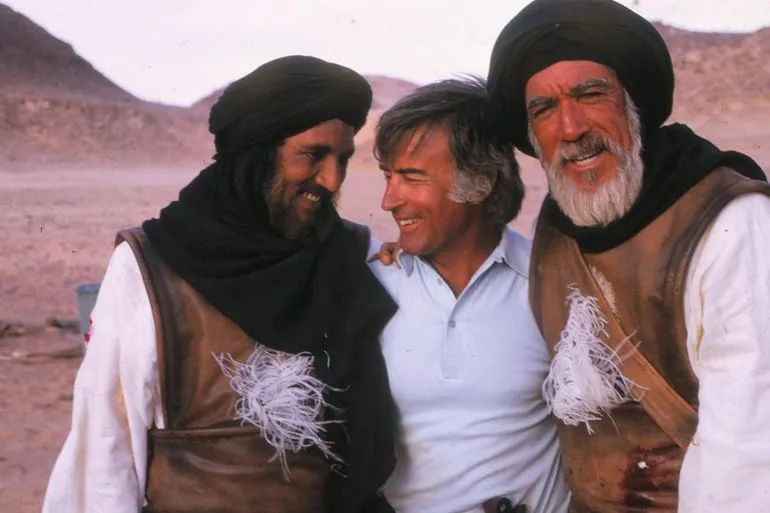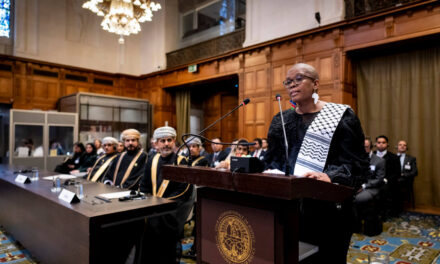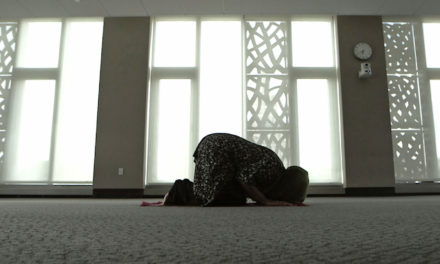Director Moustapha Akkad with actors Anthony Quinn and Abdullah Gheith at the filming set of The Message [Al Jazeera Documentary Channel]
My great-grandfather Rasim Tabaković served as an imam in the eastern Bosnian town of Višegrad. Always impeccably dressed and wearing a white prayer hat when he left his house, imam Rasim was the spiritual leader of the Muslim community in this picturesque town on the Drina River.
Muslims were a minority in communist Yugoslavia and because of the regime’s suppression of religion, practicing Muslims were a minority within the minority.
People like my great-grandfather stood as pillars in the communities of believers. He passed away in the late 1980s and is still fondly remembered by Bosniaks from the Višegrad region and beyond for his uprightness.
As a deeply pious man, he was not interested in cinema, which at that time was showing films mostly reflecting communist propaganda, which he did not relate to.
That is why when imam Rasim took my great-grandmother Hafiza to the cinema in the late 1970s – for the first and only time, as far as people can remember – it was a special occasion.
The screening Rasim took Hafiza to was of no ordinary film. It was The Message, a film directed by Syrian-American filmmaker Moustapha Akkad and starring Antony Quinn. It told the story of the beginning of Islam and the mission of Prophet Muhammad, peace be upon him, to spread the Revelation.
It was a long-awaited screening and the theatre in Višegrad was packed with Muslims of all generations. Even in Sarajevo, where my parents Fikret and Hamida were studying law at that time, the cinemas were full of people eager to see this remarkable film.
For Bosnian Muslims living under communism, the release of The Message was a landmark event. It marked the beginning of the return of religion to public life, as the communist regime was adopting a less rigid approach to Islam and other faiths.
For the first time, practising Bosnian Muslims were seeing on the big screen what they had learned at home and in mosques about the history of Islam. Many marvelled at the powerful impact that the film had and Akkad’s ability to convey the history and messages of Islam in a way that they deemed religiously appropriate using a medium usually dedicated to entertainment. Imam Rasim himself was deeply impressed by the film.
Quinn’s exceptionally impressive portrayal of the Prophet’s (PBUH) uncle Hamza conveyed on screen his fortitude and decisiveness. The Mexican-born Quinn, whose real name was Manuel Antonio Rodolfo Quinn Oaxaca, likely never imagined in the mid-1970s the extent to which his role in this film would popularise the name Hamza. The name became especially popular in the late 1980s and 90s.
Unsurprisingly, The Message turned into an educational resource for Bosnian Muslims.
I remember watching the film at my grandmother Hafa’s house in Višegrad. She used to show it to us – her grandchildren – on VHS. It was still communist Yugoslavia at that time and it was only after the collapse of the regime and Bosnia’s independence and liberalisation in the early 1990s that the film started being shown on TV.
When we moved to Malaysia in the mid-1990s because of my father’s teaching job at a Kuala Lumpur university, I saw the film featured on TV as well.
I realised that from the Balkans to Southeast Asia, The Message had become a favourite movie for Muslim communities. The success was not only due to Akkad’s remarkable skill as a director but also because there are simply not that many films on Islamic themes of the same quality and scope.
The other film regularly screened during Ramadan and the Eids is Lion of the Dessert, which is also directed by Akkad and features Quinn. It tells the story of Libyan leader and imam Omar al-Mukhtar resisting the Italian colonial invasion of his country in the 1920s and early 30s.
Akkad’s two epics were so exceptional that other productions could not match them. I remember how during one extended Eid holiday in Malaysia in the 1990s, a TV station ran out of Islam-themed films to show, so it decided to put on the Orientalist and highly controversial feature Lawrence of Arabia. This prompted one Turkish professor teaching at a Malaysian university to write a complaint to the channel.
Indeed, Akkad’s talent for portraying the history of Islam and telling the story of Omar al-Mukhtar is unparalleled. No other director has achieved what he has. Akkad went on to produce other films and his career in Hollywood was by any measure a success.
He tragically lost his life, along with his daughter Rima, in the 2005 Amman bombings carried out by al-Qaeda. It is indeed ironic that the filmmaker who did so much to spread the message of Islam through film was killed by terrorists.
The impact and influence of his most important work has outlived him. From Višegrad to Kuala Lumpur and beyond, the impact of The Message has been immeasurable. The film is Akkad’s unique contribution and his lasting legacy. It is his most consequential waqf.
The views expressed in this article are the author’s own and do not necessarily reflect Al Jazeera’s editorial stance.















